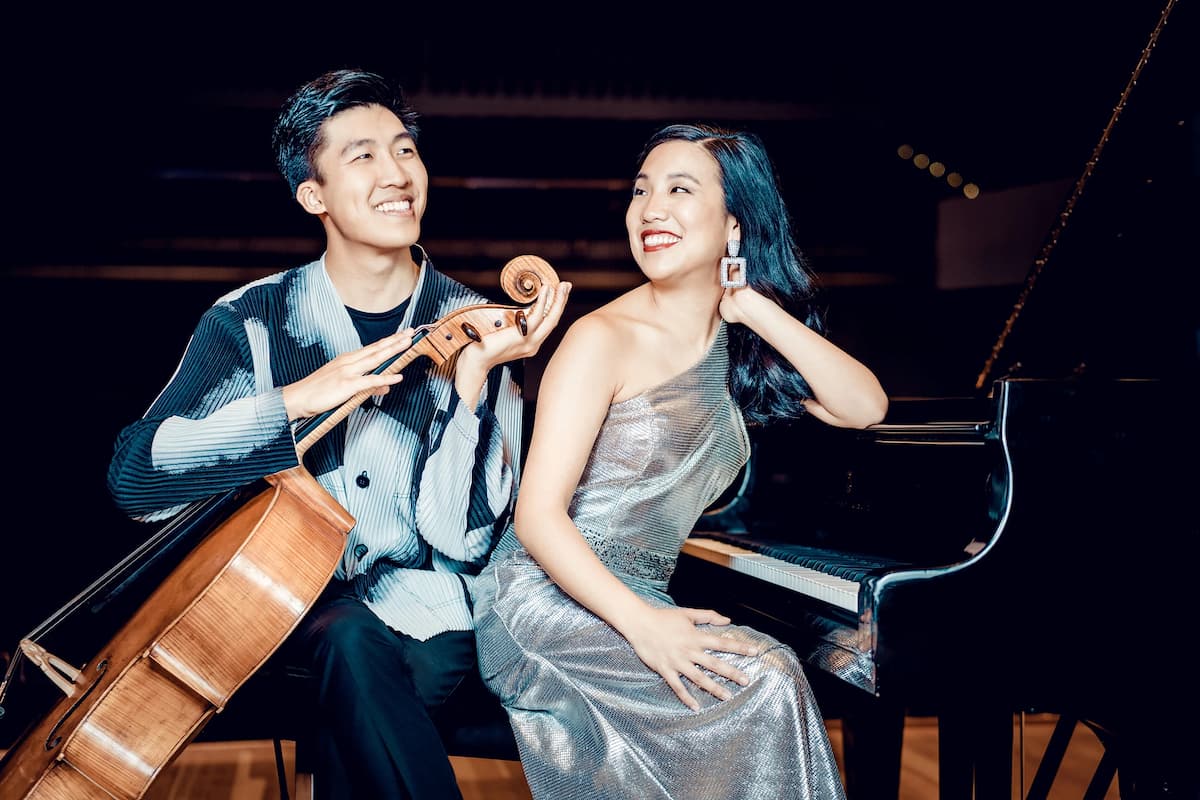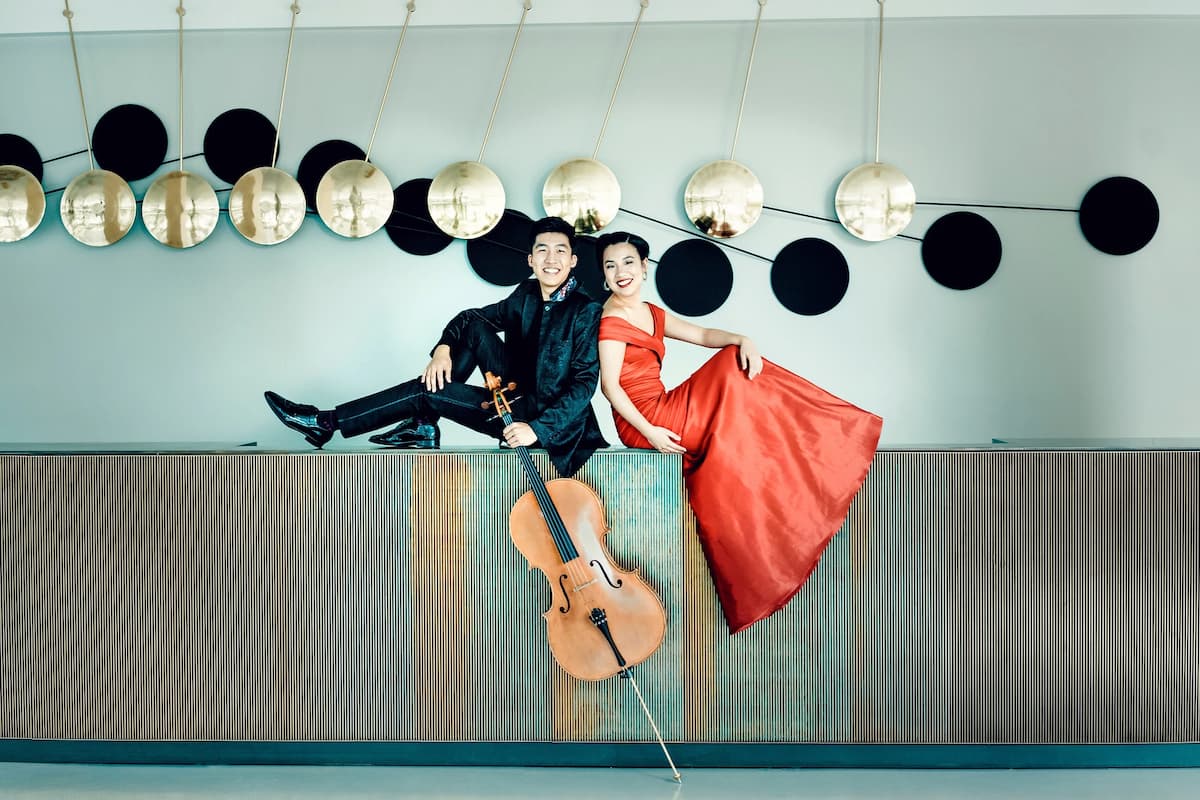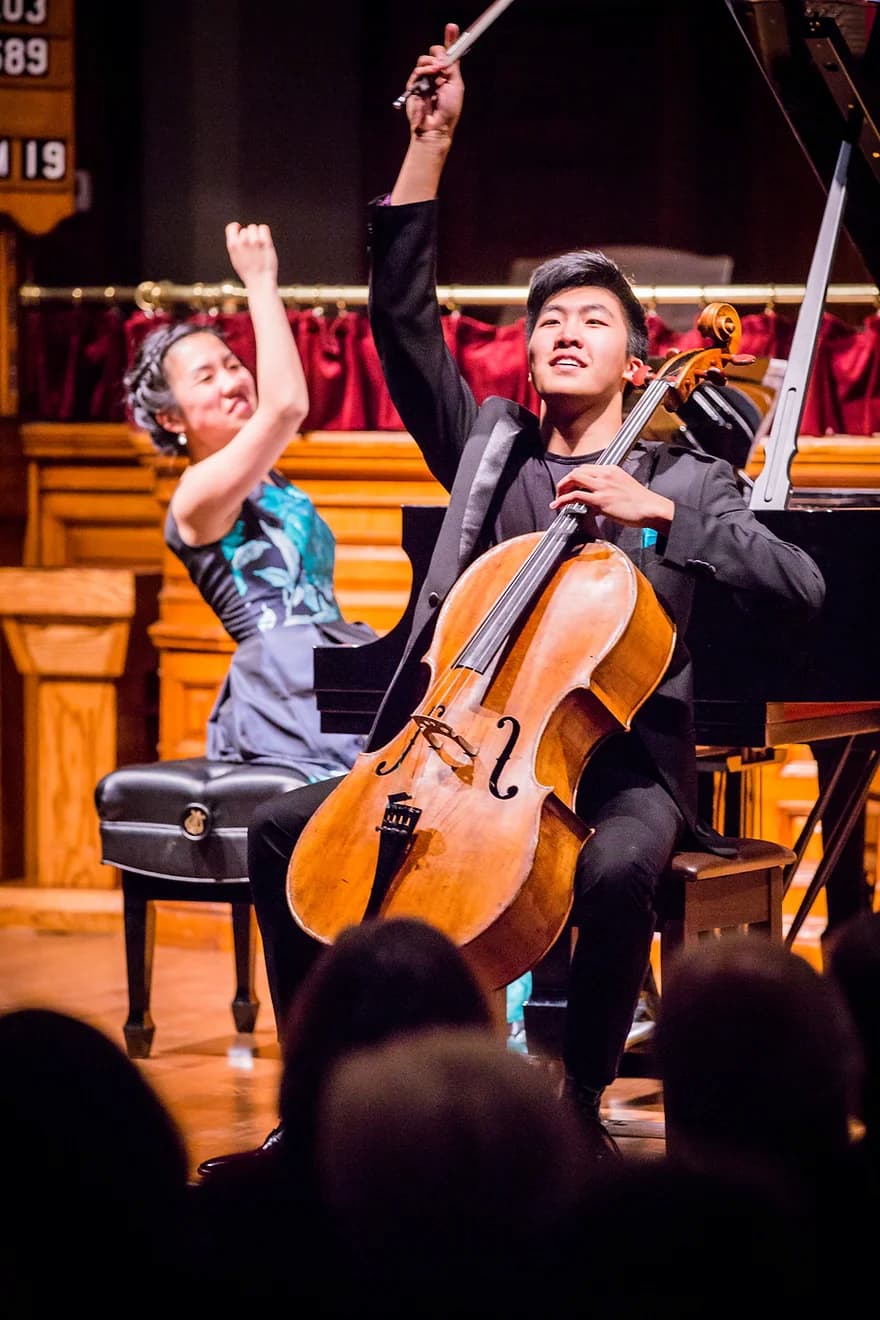‘Music is Called a Universal Language for a Reason’

Cheng2 Duo © Andrej Grilc
The ‘brilliant’ (Sunday Times, UK) and ‘truly exhilarating’ (WholeNote, Canada) Cheng2 Duo, comprised of siblings Bryan and Silvie Cheng, have been making a name for themselves as a fearless and uncompromising musical force.
Cheng2 (pronounced ‘Cheng squared’) have performed all across Canada, the US, Asia, South Africa, and Europe, known for their daring, innovative approach to programming, blending traditional repertoire with more contemporary offerings, often alongside extra-musical or cross-disciplinary elements such as multimedia video and poetry.
The brother-sister bond of Cheng2, of course, long predates their official formation in 2011, the year that saw Bryan (cello) and Silvie (piano) performing at Carnegie Hall’s Weill Hall series. We delve into the duo’s origins: how each sibling found their way to their instrument, growing up together with music ever-present in the house, through to their recent projects and visions for the future of classical music.
Rachmaninoff: Andante (III) from Cello Sonata | Cheng2 Duo (youtube.com)
How did you find your way to music?
Silvie: People always think we’re twins when they see us these days, but I’m actually six years older than Bryan, and so, being the older one, I found music before he was alive!
Neither of our parents are musicians, so we feel lucky that we sort of fell into music. It was never a plan in the stars or anything. I started lessons when I was five years old, just as a hobby.
Our parents had grown up during the Cultural Revolution in China, so they never really had the chance to learn an instrument or do anything extra-curricular, but after moving to Canada, one of their goals was to have their kids be able to explore all these things that weren’t available to them growing up, and music became one of those things.

© Andrej Grilc
Bryan: Given the fact that Silvie started earlier than me, I grew up hearing her practicing piano at home. My parents saw that I had an affinity and was interested in music, so I asked to play an instrument.
I realised I didn’t want to play the same instrument as Silvie – I wanted to have my own thing and move at my own pace, so our parents took me to this local Suzuki school in Ottawa (where we were born and raised), and there was this sort of instrument petting zoo day where you could hear demonstrations of all the orchestral instruments that were available.
I listened to some wind, strings, and percussion, and at first, I really wanted to play drums, but when my mom called the local drum school to ask if they took students aged 3, their reply was that the youngest student was 14!
I couldn’t wait that long, and I was attracted to the double bass, but of course, that was also too big for a 3-year-old, so the next thing was the cello, which had a very similar sound and timbre to the bass.
I immediately fell in love with it, and funnily enough when I started the cello I didn’t actually touch the instrument for a few months. My teacher at the Suzuki school just worked on bow exercises with me. I still remember the rhymes we used.
Silvie and Bryan: Up like a rocket, down like the rain, side to side like a choo-choo train!
Silvie: (I remember it because it was the only thing he practised for six months.)
Did you both benefit from good teachers at that early stage?
Silvie: Definitely. And throughout, at every step of the way.
Bryan: I think we’ve been really lucky. I’ve heard so many stories of friends who have started off with a teacher that they didn’t click with or later on having some sort of barrier with their teacher, and honestly, we’ve just been really privileged to have people who supported us 100% throughout our entire careers, at every step of our development.
Silvie: I think that as we grew, our love for chamber music was also formed because we didn’t just have teachers for our own instruments. Both of us got to learn from mentors of each other’s instruments, so really, it didn’t feel like we were learning to play solely our instruments; we were learning to play music. It’s a really important and lucky thing we were able to have over the years.
Nadia Boulanger: Trois Pièces pour violoncelle et piano | Cheng2 Duo
Your duo formed officially in 2011, but you’d been playing together for years before then. What prompted the ‘official’ start of your duo?
Silvie: I guess Bryan was about 5 or 6, and his teacher at the time – the one who started him on the choo-choo train exercise – had lost his teaching studio, and our parents offered him to teach some lessons in our basement temporarily. One day he heard me practising upstairs during one of his lessons and suggested that we play through some of Bryan’s Suzuki book together, so Bryan could get used to what the piano part sounded like.
So, that’s truly how we started: because Bryan’s teacher suggested it! Then, once he’d heard us play together, he decided I would play with Bryan for all his studio recitals and that Bryan wouldn’t have to use the studio pianist. I joke that I started my first unpaid internship that year!
The reason we say we ‘officially’ became our duo is because in 2011, we were asked to fill in for some injured musicians at Weill Hall at Carnegie Hall, and my professor at the Manhattan School of Music, Jeffrey Cohen, said, ‘Well, what are you going to call yourselves? You can’t just be ‘Bryan and Silvie Cheng’ at Carnegie Hall’’.
People often talk about how when they hear us playing, it feels like there are more than two people, or they talk about the idea of the power of two people, so it became Cheng to the power of 2, or Cheng2.
Bryan: The reason why it still works to this day is that it’s never felt like anything other than really ‘playing’ because we started so organically. We would go outside and build snowmen together and then come in and play pieces together. In the summer, we play soccer and then read music together.
It was always an organic, fluid part of our lives that was never segmented.
I can’t not ask the question about being siblings who play together. How is it to work with an immediate member of your family?

© Antoine Saito
Bryan: I don’t know if there’s a magic formula, to be honest. I think we’re still tweaking things now. We’re in a phase now where we work so well together that we forget about life outside of music sometimes, and so we make a conscious effort to stop working and stop talking about work.
Silvie: We live in different cities and talk once a day, no matter where we are, and we immediately launch into x, y, z, things that need to get done together, and we forget to ask, ‘How are you doing?’, or ‘What did you eat today?’, just normal sibling things, so it’s true: we run such a tight ship now that we need to cool it a bit!
Do you have a particularly memorable project as a duo?
Bryan: One of my favourite bigger projects that we did a few years ago was to celebrate the 150th anniversary of Canada being a country. We decided to celebrate with five new commissioned works for cello and piano, and we also had a whole multimedia set, both in terms of physical immersion with projector screens but also content-wise.
We made a roughly 90-minute programme where we developed visuals which included paintings and video artists and photographers from different regions of Canada. We collaborated with them to make immersive ‘concert films’ which would each complement these new commissions.
Silvie: It was one of those projects where you’re so young you just don’t know any better – you’re fearless, in a way. And now, I think that as we know better, you immediately think about logistics, which isn’t a very sexy way of being creative.
Bryan: It was really – for us and everyone else involved – a sort of dip into the deep end. It was a first-time collaboration for everyone, and therefore, there was this sense where every time we had a meeting or a brainstorm, everyone was buzzing with energy. We were still changing and tweaking things three days before the premiere.
Silvie: You constantly hear presenters or series or artists get asked what the future of classical music is going to look like, or people say that the audience is dying, so we, being young artists of the 21st century, look around and think to ourselves, ‘What can we do to contribute to this evolving art form?’
When you think about the music people our age typically listen to, or when you think of them going to a concert, whether it’s Coldplay or Taylor Swift or the Weeknd, these popular artists, what is the difference between pop and classical music?
If you take away the ‘music’ part, there’s something about the stimulation: they always have crazy outfits and lights and backup dancers, and there is so much beyond just the music. We’re not saying that we need all that necessarily, but that particular project came about because we thought maybe some of the more modern music might be easier for people of our generation to dive into with more stimulated senses.
My favourite project was our most recent album, which we released in October last year, and actually, last week, was just nominated for a JUNO award. That project addressed the question of how we can have more unity in a world where it seems like more and more cultures have divisions, whether it’s the Russia-Ukraine war or now Israel-Palestine.
Being of Chinese heritage, growing up in Canada, and now living in New York and Berlin, we feel very privileged to be citizens of the world, in a way, and we don’t feel like there’s a boundary between our Asian side and our Western side, and so we were trying to see if we could explore that musically.
This album tries to answer that question in whatever way it can by blending these elements, and hopefully, people from all different backgrounds can just listen to the music and find some sort of human connection to it because, ultimately, there’s more that bonds us and unites us than makes us different. These days, with politics, the media, and everything, we only tend to focus on what’s different, but I think that’s what makes music so special. It’s called a universal language for a reason.
Racing Horses (賽馬 / Sai Ma) | Cheng2 Duo
What are your hopes for the future of your group?
Silvie: We’d like to commission a double concerto for cello and piano. We also have ideas simmering and brewing for our next recording.
Bryan: There are certain pieces that we feel very strongly about, like the Poulenc Sonata, which we’ve both talked about a lot and would love to record in the near future. I think we really enjoy coming up with conceptual albums with pieces that may not necessarily always go together in concert, and that’s the freedom that one has on a recording: you can juxtapose pieces in a very different light.
We’re always searching for those threads that bring pieces together, and one day something will click, and we’ll say, ‘Ah, this goes really well with Poulenc,’ so it’s just a matter of all these floating jigsaw pieces coming together.
For more of the best in classical music, sign up for our E-Newsletter
Learn more about Cheng2 Duo.




